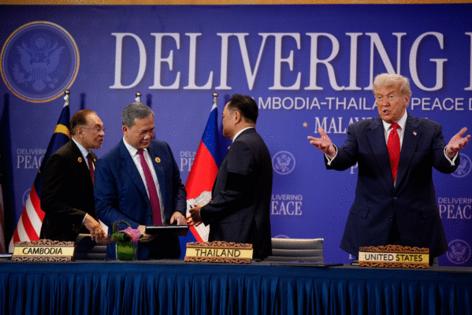Cambodia and Thailand to disarm their border after Trump's peace deal
Published in News & Features
Cambodia and Thailand took a major step toward de-escalating territorial tensions just days after a peace deal brokered by U.S. President Donald Trump, saying they will start to remove weapons from their shared border.
The two Southeast Asian nations, whose clashes in July killed more than three dozen people, will start a two-month process of removing rocket launchers, artillery systems, and battle tanks, according to a joint statement Friday by the so-called Regional Border Committee.
The bilateral disarmament plan came after the neighbors signed what Trump called the Kuala Lumpur Peace Accords at an Oct. 26 ceremony he presided over in the Malaysian capital. U.S. Secretary of War Pete Hegseth also met with defense ministers from both countries on Friday.
The accord, essentially a joint declaration, reaffirmed both countries’ commitment to resolving their border dispute through established bilateral mechanisms and outlined concrete steps to rebuild trust, including the withdrawal of heavy and destructive weapons from border areas.
Thai Prime Minister Anutin Charnvirakul said the agreement was an important outcome that would lay the groundwork for lasting peace and help mend bilateral ties. Cambodian leader Hun Manet said his country was committed to implementing the joint declaration to ensure peace.
On Friday, Cambodia and Thailand signed an agreement on the removal of heavy and destructive weapons and equipment, and both parties reaffirmed their strong commitment to fully and effectively implementing the outcome document, according to Maly Socheata, a spokeswoman for Cambodia’s defense ministry.
Cambodia hoped this positive step would contribute to the joint efforts of both countries to promote peace, stability, and a return to normalcy in the near future, she said in a statement.
Five days of intense fighting between Thai and Cambodian forces in July, involving fighter jets, missiles, and heavy artillery, killed more than 40 people and displaced hundreds of thousands from border areas in both countries. Land crossings that serve as vital trade routes have also remained restricted.
Although a ceasefire was reached in July, the two sides had continued to station troops and weaponry along their roughly 800-kilometer (500-mile) border.
The Thai-Cambodian conflict traces its roots to long-standing tensions stemming from colonial-era maps and treaties that defined their shared border. Relations had remained relatively stable after 2011 clashes that left dozens dead, before erupting again in the intense fighting in July.
©2025 Bloomberg L.P. Visit bloomberg.com. Distributed by Tribune Content Agency, LLC.







Comments